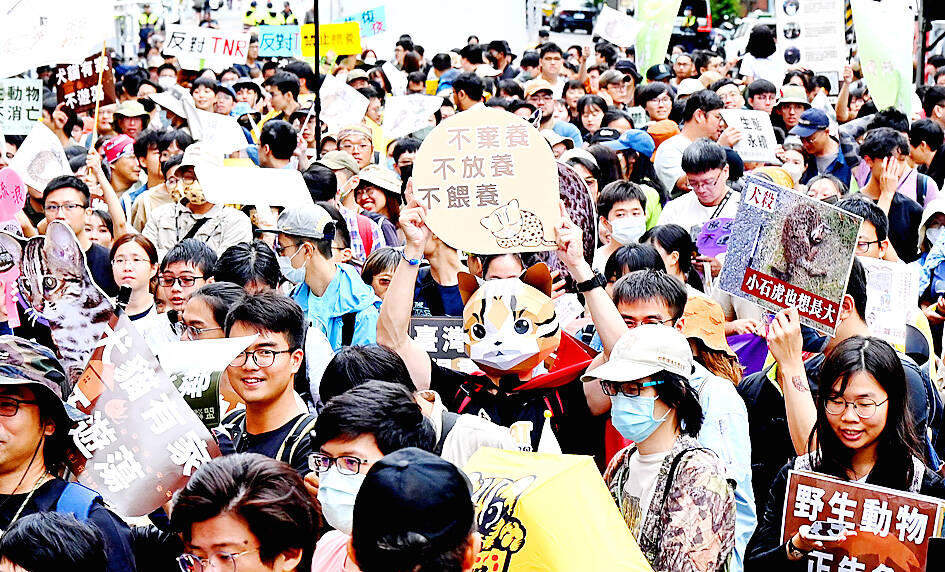Thousands of people yesterday took to the streets of Taipei calling for ethical controls for stray dogs and cats to mitigate the threat they pose to endangered wildlife.
The event, initiated by students from National Taiwan University, National Taiwan Normal University, National Tsing Hua University and National Chiayi University, was supported by a number of organizations that also took part in the march, including Wild Bird Federation Taiwan, the Leopard Cat Association of Taiwan, the Environment and Animal Society of Taiwan and the Taiwan Society for the Prevention of Cruelty to Animals.
Event organizers estimated that 4,000 people attended the rally.

Photo: Chu Pei-hsiung, Taipei Times
As of last year, the number of strays in Taiwan was nearly 160,000, said event spokesman Lee Tsung-chen (李宗宸), citing information from the Ministry of Agriculture.
Data from the ministry’s Endemic Species Research Institute showed that as of Oct. 14, the number of wild animals attacked by stray dogs or cats was three times the figure recorded 10 years ago, he added.
Philip Liao (廖朝盛) of the WildOne Wildlife Rescue Center in Taitung County’s Chihshang Township (池上) said statistics showed that an increasing number of Formosan serows and pangolins are being attacked by stray dogs and cats.
Supporting Team Social Enterprise chief executive Georny Liu (劉偉蘋) said that many people, out of kindness and love, like to feed the stray dogs and cats, but this not only can lead to poor health among the strays, but also creates problems relating to biosystems.
The government should take the matter seriously and map out measures to address it, the protesters said.
In response to such calls in the past, the ministry has designated certain “sensitive” zones where the feeding of strays is banned, leading to protests from some residents.
While supporting the policy, wildlife advocates said that more responsibility must be placed on people feeding strays, and greater cooperation with civil groups is needed.
They also called for transparency in the implementation of the policy.

A strong continental cold air mass is to bring pollutants to Taiwan from tomorrow, the Ministry of Environment said today, as it issued an “orange” air quality alert for most of the country. All of Taiwan except for Hualien and Taitung counties is to be under an “orange” air quality alert tomorrow, indicating air quality that is unhealthy for sensitive groups. In China, areas from Shandong to Shanghai have been enveloped in haze since Saturday, the ministry said in a news release. Yesterday, hourly concentrations of PM2.5 in these areas ranged from 65 to 160 micrograms per cubic meter (mg/m³), and pollutants were

Taiwan’s armed forces have established response protocols for a wide range of sudden contingencies, including the “Wan Chun Plan” to protect the head of state, the Ministry of Defense (MND) said today. After US President Donald Trump on Saturday launched a series of airstrikes in Venezuela and kidnapped Venezuelan President Nicolas Maduro, concerns have been raised as to whether China would launch a similar “decapitation strike” on Taiwan. The armed forces regularly coordinate with relevant agencies and practice drills to ensure preparedness for a wide range of scenarios, Vice Minister of National Defense Hsu Szu-chien (徐斯儉) told reporters before a

EVA Airways on Saturday said that it had suspended a pilot and opened an investigation after he allegedly lost his temper and punched the first officer several times as their plane was taxiing before takeoff at Los Angeles International Airport. According to a report published on Thursday by The Reporter, the incident occurred after the flight’s Malaysian first officer tried to warn the Taiwanese pilot, surnamed Wen (文), that he was taxiing faster than the speed limit of 30 knots (55.6kph). After alerting the pilot several times without response, the first officer manually applied the brakes in accordance with standard operating

NOT AN OPENING: Trump’s violation of international law does not affect China’s consideration in attacking Taiwan; Beijing lacks capability, not precedent, an official said Taiwanese officials see the US’ capture of the president of Venezuela as a powerful deterrent to Beijing’s aggression and a timely reminder of the US’ ability to defeat militaries equipped with Chinese-made weapons. The strikes that toppled Venezuelan President Nicolas Maduro signaled to authoritarian leaders, including Chinese President Xi Jinping (習近平), US President Donald Trump’s willingness to use military might for international affairs core to US interests, one senior official in Taipei’s security circle said. That reassured Taiwan, the person said. Taipei has also dismissed the idea that Trump’s apparent violation of international law could embolden Beijing, said the official, who was not